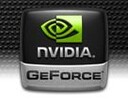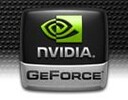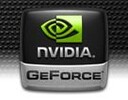NVIDIA GeForce 8600M GT vs NVIDIA GeForce 8600M GS vs NVIDIA GeForce 8600M GT SLI
NVIDIA GeForce 8600M GT
► remove from comparison
NVIDIA GeForce 8600M GT is the DirectX 10 capable successor of the GeForce Go 7600 GT for laptops. Depending on the used graphic memory and the clock speed, the performance is between the 7600 GT and 7900 GS video card. Therefore, games like Company of Heroes, Supreme Commander, or F.E.A.R can be played fluently with high details in a resolution of 1024 or similar. Still, the shader power is not sufficient to display DirectX 10 effects of games like Crysis fluently (Crysis will only run well in low details). Gamers, who every time expect supreme frame rates, should get at least a 8800M card.
The 8600M series is one of the first-laptop-GPUs, which support DirectX 10 and accelerate the H.264-decoding of HD-movies.
The particularity of this video card are the "Unified Shader". Pixel- and vertex-shaders do not exist any more but 32 of the so called stream processors do the graphic work (which up to now pixel- and vertex shaders did).
The memory clock speed depends on the used memory: 400 MHz for GDDR2 memory and 700 Mhz for GDDR3 (which is noticeable faster).
The integrated PureVideo engine is one of the advantages of the 8600M GT. It supports (HD) encoding of H.264, VC-1, MPEG2, and WMV9 video content. Compared to the slower 8600M GS (and 8400M series) the 8600M GT supports a few more video features (see comparison chart).
NVIDIA GeForce 8600M GS
► remove from comparison
NVIDIA GeForce 8600M GS is the DirectX 10 capable successor of the GeForce Go 7600 / 7700 for laptops and technically a higher clocked 8400M GT.. The performance is slightly above the 7600 / 7700 and therefore it can represent current games fluently. For DirectX 10 effects, the power of the card is not sufficient. Current demanding games like Crysis are only playable with the lowest settings.
8600M is one of the first-laptop-GPUs, which support DirectX 10 and accelerate the H.264-decoding of HD-movies. In comparison the the 8600M GT the GS version features less video options. > PureVideo Product Comparison
The particularity of this video card are the "Unified Shader". Pixel- and vertex-shaders do not exist any more but 16 of the so called stream processors do the graphic work (which up to now pixel- and vertex shaders did).
NVIDIA GeForce 8600M GT SLI
► remove from comparison
The NVIDIA GeForce 8600M GT SLI are two single DirectX10 capable 8600M GT graphic cards in SLI combination. Depending on the particular games, the combination is about 0-60% faster than one single graphic card. DirectX9 games can be played with higher resolutions and high details fluently (if SLI is supported). DirectX 10 games are very demanding (e.g. Crysis and World n Conflict) and can't be played in highest DirectX 10 detail levels fluently, at moment. Perhaps, that will improve by later driver optimizing.
The 8600M is one of the best laptop-GPUs worldwide, which support DirectX 19 and H.264-decoding and accelerate HD-films.
A particularity of the graphic card are the "Unified Shaders" of ALUs (Arithmetic Logical Unit). There don't exist any more dedicated pixel- and vertex shaders but 32 so called Stream processors maintain the upcomming graphic work (which was done by the pixel and vertex Shaders, up to now). The advantage is that there is no idle time of the ALUs. The Stream processors of NVIDIA are 1-dimensional (1D) and can make one skalar operation per cloc with a MADD operation (addition and multiplication) and a MUL-operation (multiplication). Moreover, NVIDIA clocks the Shader-ALUs higher than the remaining chip.
The memory clock of each GeForce 8600M GT of the SLI combination depends on the implemented memory type: 400 MHz with GDDR2 and 700 MHz with GDDR3.
Compared with dektop graphic cards, the 8600M GT in SLI combination of the GDDR3 laptop version is scarcely below two 8600 GT SLI (each desktop card has a higher chip clock).
| NVIDIA GeForce 8600M GT | NVIDIA GeForce 8600M GS | NVIDIA GeForce 8600M GT SLI | ||||||||||||||||||||||||||||
| GeForce 8600M Series |
|
|
| |||||||||||||||||||||||||||
| Codename | G84M | G84M | NB8P-GS | |||||||||||||||||||||||||||
| Architecture | G8x | G8x | G8x | |||||||||||||||||||||||||||
| Pipelines | 32 - unified | 16 - unified | 64 - unified | |||||||||||||||||||||||||||
| Core Speed | 475 MHz | 600 MHz | 475 MHz | |||||||||||||||||||||||||||
| Shader Speed | 950 MHz | 1200 MHz | 950 MHz | |||||||||||||||||||||||||||
| Memory Speed | 700 MHz | 700 MHz | 700 MHz | |||||||||||||||||||||||||||
| Memory Bus Width | 128 Bit | 128 Bit | 128 Bit | |||||||||||||||||||||||||||
| Memory Type | GDDR3, GDDR2 | GDDR3, GDDR2 | GDDR3, GDDR2 | |||||||||||||||||||||||||||
| Max. Amount of Memory | 512 MB | 512 MB | 1024 MB | |||||||||||||||||||||||||||
| Shared Memory | no | no | no | |||||||||||||||||||||||||||
| API | DirectX 10, Shader 4.0 | DirectX 10, Shader 4.0 | DirectX 10, Shader 4.0 | |||||||||||||||||||||||||||
| Power Consumption | 20 Watt | 20 Watt | 20 Watt | |||||||||||||||||||||||||||
| Transistors | 289 Million | 289 Million | 598 Million | |||||||||||||||||||||||||||
| technology | 80 nm | 80 nm | 80 nm | |||||||||||||||||||||||||||
| Features | Shader clock frequence 950 MHz, PureVideo technology (H.264, VC-1, MPEG2, WMV9 decoding acceleration), MPEG2, WMV9 decoding acceleration), HDCP-capable, PowerMizer 7.0 power management (dynamic switching between performance and energy economizing), HDR (High Dynamic-Range Lighting), designed for Windows Vista, 16x full screen AA, 16x AF independent of angles, 128-Bit HDR illumination with AA, Dual-Link DVI-D exits for resolutions of TFT up to 2560x1600, PCI-E 16x, OpenGL 2.1, Gigathread technology | Shader Taktfrequenz 1200 MHz, PureVideo Technologie (H.264, VC-1, MPEG2, WMV9 Decodierbeschleunigung), HDCP-fähig, PowerMizer 7.0 Energieverwaltung (dynamisches umschalten zwischen Leistung und Energiesparen), HDR (High Dynamic-Range Lighting), designed für Windows Vista, 16x Vollbild AA, 16x winkelunabhängiges AF, 128-Bit HDR Ausleuchtung mit AA, Dual-Link DVI Ausgänge für Auflösungen von TFT bis zu 2560x1600, PCI-E 16x, OpenGL 2.1, Gigathread Technologie | Two single graphic cards in SLI combination, Shader clock frequence 950 MHz, PureVideo technology (H.264, VC-1, MPEG2, WMV9 decoder acceleration), HDCP-capable, PowerMizer 7.0 energy management (dynamic switching between performance and energy saving), HDR (high dynamic-range lighting), designed for Windows Vista, 16x full image AA, 16x AF independent on angles, 128-bit HDR illumination with AA, Dual-Link DVI exits for TFT resolutions up to 2560x1600, PCI-E 16x, OpenGL 2.1, Gigathread technology | |||||||||||||||||||||||||||
| Notebook Size | medium sized | medium sized | large | |||||||||||||||||||||||||||
| Date of Announcement | 09.06.2007 | 09.06.2007 | 23.10.2007 | |||||||||||||||||||||||||||
| Information | Speichertakt (Vorgaben):
DDR2 - 400 MHz DDR3 - 700 MHz | memory clock:
DDR2 - 400 MHz DDR3 - 700 MHz | ||||||||||||||||||||||||||||
| Link to Manufacturer Page | www.nvidia.com | www.nvidia.de | www.nvidia.de |
Benchmarks
3DM Vant. Perf. total + NVIDIA GeForce 8600M GT
Average Benchmarks NVIDIA GeForce 8600M GT → 100% n=5
Average Benchmarks NVIDIA GeForce 8600M GS → 84% n=5
Average Benchmarks NVIDIA GeForce 8600M GT SLI → 170% n=5
* Smaller numbers mean a higher performance
1 This benchmark is not used for the average calculation
Game Benchmarks
The following benchmarks stem from our benchmarks of review laptops. The performance depends on the used graphics memory, clock rate, processor, system settings, drivers, and operating systems. So the results don't have to be representative for all laptops with this GPU. For detailed information on the benchmark results, click on the fps number.
Average Gaming NVIDIA GeForce 8600M GT → 100%
Average Gaming 30-70 fps → 100%
Average Gaming NVIDIA GeForce 8600M GS → 94%
Average Gaming 30-70 fps → 101%
Average Gaming NVIDIA GeForce 8600M GT SLI → 120%
Average Gaming 30-70 fps → 123%
| NVIDIA GeForce 8600M GT | NVIDIA GeForce 8600M GS | NVIDIA GeForce 8600M GT SLI | |||||||||||||||||||
|---|---|---|---|---|---|---|---|---|---|---|---|---|---|---|---|---|---|---|---|---|---|
| low | med. | high | ultra | QHD | 4K | low | med. | high | ultra | QHD | 4K | low | med. | high | ultra | QHD | 4K | ||||
| Crysis - GPU Benchmark | 46 | 19 | 9 | 42.67 | 14.48 | 7.89 | 52.6 | 21.5 | 12.8 | ||||||||||||
| Crysis - CPU Benchmark | 44 | 17 | 9 | 38.11 | 14.26 | 7.43 | 54.4 | 26.3 | 11.3 | ||||||||||||
| World in Conflict - Benchmark | 28 | 13 | 37 | 16 | |||||||||||||||||
| F.E.A.R. | 263 | 75 | 32 | 290 | 86 | 45 | 208 | 30 | 29 | ||||||||||||
| Doom 3 | 135 | 127 | 113 | 79 | 123 | 116 | 98 | 67 | 159.8 | 160.5 | 154.9 | 138.4 | |||||||||
| Quake 3 Arena - Timedemo | 361 | 318 | |||||||||||||||||||
| NVIDIA GeForce 8600M GT | NVIDIA GeForce 8600M GS | NVIDIA GeForce 8600M GT SLI | |||||||||||||||||||
| low | med. | high | ultra | QHD | 4K | low | med. | high | ultra | QHD | 4K | low | med. | high | ultra | QHD | 4K | < 30 fps < 60 fps < 120 fps ≥ 120 fps | 2 2 | 3 1 1 | 3 1 1 1 | 1 | | | < 30 fps < 60 fps < 120 fps ≥ 120 fps | 2 2 | 2 2 | 2 1 1 1 | 1 | | | < 30 fps < 60 fps < 120 fps ≥ 120 fps | 2 2 | 2 2 1 | 4 1 | 1 | | |
For more games that might be playable and a list of all games and graphics cards visit our Gaming List



















